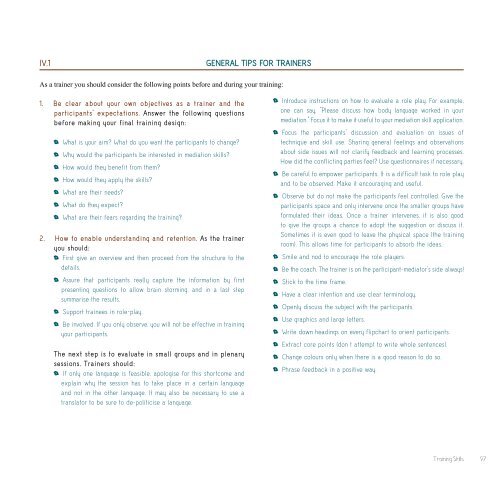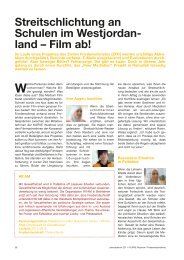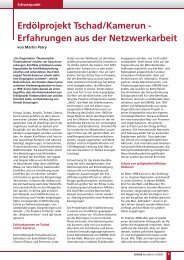Merging Ethiopian Wise-Counsel Mediation and Facilitative ...
Merging Ethiopian Wise-Counsel Mediation and Facilitative ...
Merging Ethiopian Wise-Counsel Mediation and Facilitative ...
- No tags were found...
You also want an ePaper? Increase the reach of your titles
YUMPU automatically turns print PDFs into web optimized ePapers that Google loves.
Iv.1General Tips for TrainersAs a trainer you should consider the following points before <strong>and</strong> during your training:1. Be clear about your own objectives as a trainer <strong>and</strong> theparticipants' expectations. Answer the following questionsbefore making your final training design:> > What is your aim? What do you want the participants to change?> > Why would the participants be interested in mediation skills?> > How would they benefit from them?> > How would they apply the skills?> > What are their needs?> > What do they expect?> > What are their fears regarding the training?2. How to enable underst<strong>and</strong>ing <strong>and</strong> retention. As the traineryou should:> > First give an overview <strong>and</strong> then proceed from the structure to thedetails.> > Assure that participants really capture the information by firstpresenting questions to allow brain storming, <strong>and</strong> in a last stepsummarise the results.> > Support trainees in role-play.> > Be involved. If you only observe, you will not be effective in trainingyour participants.The next step is to evaluate in small groups <strong>and</strong> in plenarysessions. Trainers should:> > If only one language is feasible, apologise for this shortcome <strong>and</strong>explain why the session has to take place in a certain language<strong>and</strong> not in the other language. It may also be necessary to use atranslator to be sure to de-politicise a language.> > Introduce instructions on how to evaluate a role play. For example,one can say, "Please discuss how body language worked in yourmediation." Focus it to make it useful to your mediation skill application.> > Focus the participants' discussion <strong>and</strong> evaluation on issues oftechnique <strong>and</strong> skill use. Sharing general feelings <strong>and</strong> observationsabout side issues will not clarify feedback <strong>and</strong> learning processes.How did the conflicting parties feel? Use questionnaires if necessary.> > Be careful to empower participants. It is a difficult task to role play<strong>and</strong> to be observed. Make it encouraging <strong>and</strong> useful.> > Observe but do not make the participants feel controlled. Give theparticipants space <strong>and</strong> only intervene once the smaller groups haveformulated their ideas. Once a trainer intervenes, it is also goodto give the groups a chance to adopt the suggestion or discuss it.Sometimes it is even good to leave the physical space (the trainingroom). This allows time for participants to absorb the ideas.> > Smile <strong>and</strong> nod to encourage the role players.> > Be the coach. The trainer is on the participant-mediator's side—always!> > Stick to the time frame.> > Have a clear intention <strong>and</strong> use clear terminology.> > Openly discuss the subject with the participants.> > Use graphics <strong>and</strong> large letters.> > Write down headings on every flipchart to orient participants.> > Extract core points (don’t attempt to write whole sentences).> > Change colours only when there is a good reason to do so.> > Phrase feedback in a positive way.Training Skills97
















